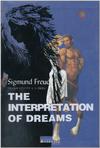梦的解析
出版时间:2011-5 出版社:中央编译出版社 作者:弗洛伊德 页数:602 译者:A.A.布里尔
内容概要
FREUDIAN
psychological reality begins withthe world, full of objects. Among
them is a veryspecial object, the organism. The organism isspecial
in that it acts to survive and reproduce,and it is guided toward
those ends by its needs--hunger, thirst, the avoidance of pain, and
sex.
A part--a very important part--of
theorganism is the nervous system, which has as oneof its
characteristics a sensitivity to theorganism's needs. At birth,
that nervous systemis little more than that of any other animal,
an"it" or id. The nervous system, as id, translatesthe organism's
needs into motivational forcescalled, in German, Triebe, which has
beentranslated as instincts or drives. Freud also calledthem
wishes. This translation from need to wishis called the primary
process.
作者简介
弗洛伊德(Freud Sigmund
1856-1939),奥地利精神病医生,精神分析学派的创始人,终生从事著作和临床治疗。提出“潜意识”、“自我”、“本我”、“超我”、“伊底帕斯情结”、“性冲动”等概念,认为人类男性天生具有伊底帕斯情结,女性天生具有厄勒克特拉情结。其成就对哲学、心理学、美学甚至社会学、文学等都有深刻的影响,被世人誉为“精神分析之父”。他的思想极为深刻,探讨问题中,往往引述历代文学、历史、医学、哲学、宗教等材料。
政治学家保尔·娄森认为,弗洛伊德“毫无疑问是历史上最伟大的心理学家之一”,而且是“一位伟大的思想家”。神学家保尔·蒂利希认为他是“所有深层心理学家当中最有深度的一位”。
书籍目录
INTRODUCTION:FREUD
AND THE SCIENTIFIC METHOD
PREFACE
CHAPTER 1(PART 1)THE SCIENTIFIC LITERATURE OF DREAM-PROBLEMS(UP TO
1900)
CHAPTER 1(PART 2)THE SCIENTIFIC LITERATURE OF DREAM-PROBLEMS(UP TO
1900)
CHAPTER 2 THE METHOD OF DREAM INTERPRETATION
CHAPTER 3 THE DREAM AS WISH-FULFILMENT
CHAPTER 4 DISTORTION IN DREAMS
CHAPTER 5(PART 1) THE MATERIAL AND SOURCES OF DREAMS
CHAPTER 5(PART 2) THE MATERIAL AND SOURCES OF DREAMS
CHAPTER 6(PART 1) THE DREAM-WORK
CHAPTER 6(PART 2) THE DREAM-WORK
CHAPTER 6(PART 3) THE DREAM-WORK
CHAPTER 6(PART 4) THE DREAM-WORK
CHAPTER 7(PART 1) THE PSYCHOLOGY OF THE DREAM PROCESSES
CHAPTER 7(PART 2) THE PSYCHOLOGY OF THE DREAM PROCESSES
章节摘录
版权页:I have never believed that the world needs a St. George to conquer thedragon of Freudian error. I believe that ordinary rational men who arenot captured by professional status images can see the artificiality andlack of genuine love for humanity that characterizes his theories. Oncethis insight has become established in men's minds, what use can it be tofollow Freud into all the byways and sidetracks with which he sought tocover up his own sense of being on shaky ground? How many times doesan individual have to prove that one and one are two? Freud obviously had some kind of high impact influence on thepsychological thinking of his time. I wish to identify the nature of thatinfluence without getting lost in the kind of polemics which becomesinvective, a fate which has overcome many of his critics. It is necessaryfor the critic to be firmly oriented toward the search for truth abouthuman nature in his own life if his analysis of Freudian error is to be acontribution to the building of a science of human nature. This monograph is not primarily adversarial in structure. Truth willstand on its own feet, just as error will die of its own weight. Although Irepeatedly point out that Freud made significant and undermining errors,I am doing this to emphasize that every thinker in the human field neednot be lost in the same way. I am primarily interested in creating a bridgefor the communication of my own insights. Polemic writing alwaysmakes for easier comprehension, and no one has ever accused me in thepast of presenting psychological material in a fashion that makes it goodvacation reading.
图书封面
评论、评分、阅读与下载
用户评论 (总计29条)
- 1900年,弗洛伊德出版了划时代的著作《梦的解析》,在最初的十年间乏人问津,然而不久即震撼了西方知识界,并在思想、文化乃至美学、文学、神话、民族研究等诸多领域产生深刻而广泛的影响。1956年,美国的唐斯博士称其为“改变历史的书”、“划时代的不朽巨著”,与哥白尼的《天体运行论》、达尔文的《物种起源》并列为导致人类思想革命的三大奇书。
弗洛伊德的最大贡献在于他发现了人类的潜意识。按照弗氏理论,人的意识是由本我、自我、超我三个层面构成的,而日常生活往往将本我、自我压抑到潜意识里,而梦通过凝缩、转移和二重加工将其释放出来,于是就有了古今往来千奇百怪的梦境。弗氏还将性力作为人的一切欲望和冲动的基本动力,虽说有些令人难以接受,但的确为人类打开心灵之门找到了一把钥匙,《圣经》以及世界各民族的文本中记录的梦境、异象,希腊神话中的所谓俄狄甫斯恋母情结等诸多文化现象,自此都迎刃而解。 - 其实刚刚看到开篇的序而已,放了一个持与弗洛伊德不同观点的文作为序,还挺有意思的。
我想不通我为什么装逼得要死非要买英文版的,有点难懂。 - 能读英文版的好厉害
- 质量还不错,但是后悔买英文版的了,好深奥啊,看不懂,很伤感自己英语怎么不再好点!!
- 这书名大,自不必说,但是在英文版本里,目前这般是佼佼者!
- 书刚到,还没来得急看,包装有点旧。可能会遇到很多不认识的单词,但是一定会坚持看下来的。
- 我很喜欢心里了解一下外国人的心理是怎样的
- 全英文,有压力,不过是好书
- 还没看,以后当床头书,没事翻两页看看
- 边看边查字典,看得太痛苦了,但是书质量很好,前面那多人的画,我一个一个上维基百科查……呃,英文不好,悔不当初啊!
- 看原著还是比翻译来得好的
- 看了中文,再看英文,有助于提高英语水平。
- 非母语,需要慢慢读!
- 很棒的一本书赞一个正版
- 从心理学解析梦,很专业!
- 想买很久了!英文版点赞~快递还是很快的~除了书封面有点小灰尘……其他都还好,不错的睡前读物
- 一看书的封面就觉得质量一般,不值五十块钱,但里面印的还行,至于内容还没看,因为是英文版,理解起来比较费劲,有一些专业术语,查字典也查不出,所以建议想通过这本书学习英语的还是换本儿吧;
- 如果你爱心理学,这本书要看哦.
- 脱胶严重,封壳很脏,影响了整体质量
- 这本书很厚啊,不过包装很好,里面的印刷就不怎么样了,这是我们老师推荐看的书,所以买来看看
- 朋友觉得不错。
- 书很好,就是送来时不干净
- 内容更好看,为了锻炼一下英语能力。。
- 摸起来有一层灰,角有点折了
- 只不过这包装。。。。。。
- 还没看,不过纸质挺一般
- 需要有相当的英文水平才好,感觉自己水平太次了,打算结合着中文版的对照着看
- 首先,在收到书本的时候,折痕比较严重,当然不排除运送过程影响,但以前买书可真没这么严重!其次,书本质量不是特别满意,端面能看到溢出多余的胶,书本切断面呈锯齿形状,一点都不平整;封皮刚开始以为是硬质,一拿才知道是软的,其实这无所谓,不影响阅读就好。再次,刚拿到手翻了几页,竟然有一页是用胶纸粘上的,虽然我不追求完美,但这我真的不是很容易忍受了!整体来说,不太满意,四十多买的书感觉比街边儿买的好不了很多,有时间去书店看看,如果正版是这个样子的,那我只能说出版社赚的钱太多了,或者钱让别人赚走了!等我去完书店再评!
- 从英文介绍来看,有些单词之间没有空格,是否书上也这样?国内英文版书经常有各种错误,如漏掉字母甚至漏掉几行,有的单词拼写错误或者之间无空格,等等!总之,国内的英文版书都不敢买了,即使外语教学与研究出版社也不例外!
